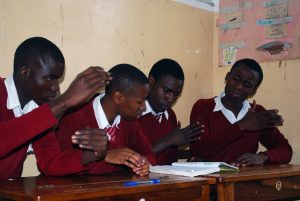March, 2025 - Update #3
Small Stories from Arusha 3
Online – Offline
Greetings from Arusha! You learn all kinds of things just by being in a different environment. For instance, I have become more aware of my own dependence on online activities. When the electricity goes out at our apartment here in Tanzania, I have to find something else to do besides fiddling with my computer or browsing my phone. Since the Wi-Fi runs on electricity and using mobile data with a Finnish plan is far too expensive, even reading a book isn’t usually an option, as we are at home in the evenings when it’s already dark. So, I have had to return to offline work, something I had almost forgotten.
At the mentors’ training site, Meru School, power outages have not been a major issue, as fiber cable internet is available and can be quickly reconnected by support staff when needed. The mentors can continue their work without disruption. (Of course, there are other issues, such as logging into Microsoft Office, which has not been straightforward from Tanzania.) I can only imagine the challenges a regular school would face during a power outage if many of its activities were dependent on being online. Laptops, of course, can function for a while without electricity, but Wi-Fi does not. The local mobile network is an option, using the school’s or a teacher’s phone, but it is not a sufficient solution when there are many users. Therefore, various plan B’s, C’s, and D’s need to be in place, just as was the case in Finnish schools a few years ago. On the other hand, many smart pedagogical activities can be done without Wi-Fi. Students can plan and write text together in Word. They can work in pairs to create PowerPoint presentations. They can review ready-made Excel charts and learn about data visualization. And, of course, there is always the simple act of reading books—during daylight hours.
Sometimes it feels like many fundamental pedagogical skills—reading and writing being the most important—are overlooked in the constant learning of new digital tools. Here in Tanzania, I have come to understand how valuable and essential literacy is for all people. It is through literacy and the conceptual thinking it enables that we can learn, understand complex matters, develop new ideas, and critically evaluate information. For example, it is impossible to teach critical reading skills for online texts if the basic literacy level is too low—something that has been noted in many contexts in Finland.
According to Wikipedia, 68% of the Tanzanian population is literate, at least to some extent. However, many students transition from primary school to secondary education without having fully acquired literacy skills. This is not surprising—there are very few books available for primary school children, books are expensive, and newspapers, though available, are a luxury only for the wealthiest. A reading culture is largely missing. Learning to read is even more challenging for deaf children and young people.
It would be great if, during this mentoring program, we could also address the next level of basic literacy: critical literacy! For example, students should be taught practical methods for assessing the reliability of online information and how to synthesize information from different sources. I tried to find existing English-language materials on this topic—after all, in Finland, we have excellent projects like the Critical initiative—but much of the material would need to be adapted to the Tanzanian context first. Perhaps some of the mentors being trained could start developing learning materials to support critical literacy?
Liisa Ilomäki

Four deaf students and one book